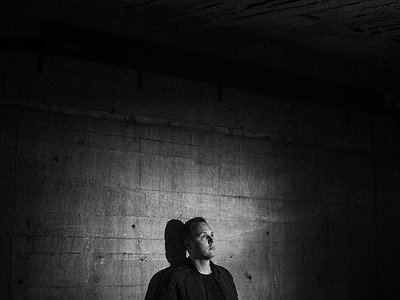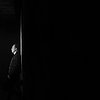Could you take us through a day in your life, from a possible morning routine through to your work? Do you have a fixed schedule? How do music and other aspects of your life feed back into each other - do you separate them or instead try to make them blend seamlessly?
Music tells about life so I don’t see the point of separating the one from the other. Of course I do need times where I can focus on my music, where I close the door, silence the phone and try to write music but I try to be not too dogmatic about it. You can try to get into a creative mood but you can’t force it. One day you feel creative, the other you don’t. That was an important lesson to learn: that the more rested I am, the more creative I feel. That’s why I try to sleep till I wake up without help whenever possible. I’m touring the weekends (and we electronic musicians tour the whole year) and there’s not a lot of sleep. You play at a festival, a club, you maybe get 3 hours of sleep and then you need to catch the next flight. You need to balance this out during the week.
I always start the day with a long breakfast, reading the news, I need some time to really wake up. Then I usually read and answer mails and work on office things. Some say you’re most creative hours are after waking up…they’re probably right but I need to get the office away before I can start writing music. I think it’s because I like to write in longer blocks and I need the freedom to not interrupt a session when the creative juices are flowing. I always try to have one meeting free day a week where I can just focus on the music without any "planned interruptions" like meetings with management, with PR, with labels, etc.
There are many descriptions of the ideal state of mind for being creative. What is it like for you? What supports this ideal state of mind and what are distractions? Are there strategies to enter into this state more easily?
I’m not looking for this ideal state of mind because I don’t want to get lost in finding it. I just start writing and this usually gets everything flowing. Sometimes it does not and then I leave the studio because I learnt that otherwise I just get frustrated and this really leads to a problem because then I want to make up for this "lost" day the next one and that adds a lot of pressure. Of course, if you’re part of a bigger project like a movie for example, you don’t have the luxury to just quit for the day because other people are relying on you and you have to push through this wall. But I also see this as part of the process and in the end this also reflects somehow in the result … for me the art lies in the process itself. Sometimes it’s an easy one and sometimes it’s a really hard one. But that’s good, it’s about getting involved one way or the other and if you feel blocked for some reasons, maybe one reason is that you haven’t found the right angle yet. It’s probably the same in all arts …o ne moment you’re on top of the world, the other one you have no idea how you ever could have thought you’re good enough to do it.
The only strategy I actually have is to write as much and as regularly as possible because then the chances are higher that you write something worth listening to … at least I hope so :D At the same time getting enough leisure time is very important because creativity is gained from living, from experiences and working just the attempt to make something out of it.
How do you make use of technology? In terms of the feedback mechanism between technology and creativity, what do humans excel at, what do machines excel at?
A lot since I’m rarely working with real musicians in my music. At the same time I see the technology just as a tool that enables me to do my music. You have to come up with your own ideas, the technology won’t do it for you.
Production tools, from instruments to complex software environments, contribute to the compositional process. How does this manifest itself in your work? Can you describe the co-authorship between yourself and your tools?
I wouldn’t call it co-authorship. They’re just tools to me. They help me to bring my ideas to life and of course, on that soil new things are growing but in the end nothing would be there without the original idea. Sure, the sound of an instrument or maybe also the possibilities of a software environment can have an influence somehow but especially in terms of software I’m not sure if that’s really something good. On the one hand yes, because it helps you to get a better idea of the things you hear in your head and if it’s worth going forward with them, on the other hand it can restrict you heavily because if you’re not able to use your tools, you start writing for them and most of the times that’s a big big limitation. Think about writing for an orchestra, there are tons of good sample libraries out there, but none of them covers every single aspect of an orchestra. So, even though it’s amazing that you can write for the orchestra on your computer and make it sound like one, you can only do what the samples enable you to do. If there’s an articulation missing then you can’t use it. So in the end this really limits you and you’d better use pen and paper for composing because then your imagination is the only limitation. The big question that comes afterwards is if you’re able to bring it to life with a real orchestra or whatever.
If you ask me, it’s a big misunderstanding that the tools really matter when it comes to being creative. They can be a starter, make things easier or whatever, but without a real idea nothing will ever happen. It’s not about having the newest plugins, the best sequencer, the best guitar in the world, it’s about what you can do with it. Maybe it’s exactly that shitty setup that brings out all your creativity because you have to find to make it work with that shitty setup.
How do you see the relationship between sound, space and performance and what are some of your strategies and approaches of working with them?
Well, if you break down what I’m doing, I’m actually writing program music. Be it in the form of club music or as a score to picture. Both the physical enviroment of a room/space of a club or festival enviroment and the one you see in the picture are having a big influence on the music. If it's a small room, it’s not really fitting if the music is sounding epic and wide. If it's a super bright and warm room it might be strange if the music is super-dark and raw. When you learn the piano, it’s not just about pressing the right keys in the right order, it’s also about how you press them … are you sitting up straight and stiff, you’re playing will sound stiff. Sometimes that’s what you want. But if you play Debussy for example, or Rachmaninow you need to move your body. You’re just able to play that very small, subtle, soft emotional line if you make yourself small and press those keys very careful as you would juggle with raw eggs. If you want to play La Mer, you have to be the sea. So, to answer your question, for me there’s no music without sound, space and performance (or call it expression). It’s no coincidence that techno is happening in dark industrial places like Berghain for example, or that the more melodic and bright colours of electronic music are mostly happening day time, outside in the sun.
Our sense of hearing shares intriguing connections to other senses. From your experience, what are some of the most inspiring overlaps between different senses - and what do they tell us about the way our senses work? What happens to sound at its outermost borders?
I don’t know what those overlaps tell us about the way our senses work, but for me the overlaps between hearing, seeing and feeling were always most inspiring … but in the end it’s everything. Take electronic music, take techno music, for a lot of people it’s just noise, but take them into a club with a big sound system and good light … all of a sudden you can connect to it because the music you listen to is getting extended with the people around you, the vibe in the room, the corresponding lights and that massive sound system that makes your body vibrate with every single beat. It’s everything, the smell of the club and the people around you will also have an influence. I just met Joel Mull on tour, he’s a very inspiring electronic music artist from Sweden, who burns incense sticks at his performances. I was so surprised when he told me that because it’s so obvious that bringing in a smell opens up another level. It’s nice to listen to electronic music at home or Mahler’s Symphony No. 1 for example but it’s something completely different to listen to it in a concert situation where way more senses are animated.
Art can be a purpose in its own right, but it can also directly feed back into everyday life, take on a social and political role and lead to more engagement. Can you describe your approach to art and being an artist?
My approach isn’t political even though I’m politically interested. I’m happy if people let my music be a part of their lives for some seconds and I’m even happier if it gives them a good feeling or helping them to deal with something … but I’m writing my music first and foremost for myself. It’s my way of expressing my feelings and to deal with the things happening around me or about bringing in my view of things.That’s not necessarily unpolitical, but there’s no purposely political element in my music. I don’t know if there’s an approach to be an artist, if you ask me, you either are one because of your creative work or you're not. Who defines that? Who cares? My music isn’t getting any better just because somebody calls it art or not.
It is remarkable, in a way, that we have arrived in the 21st century with the basic concept of music still intact. Do you have a vision of music, an idea of what music could be beyond its current form?
It can be everything and it’s changing every single day with every new note written by a composer out there. Maybe it’s not changing big time but every new input might change a little thing in the long run. We came a long way from somebody sitting on a rock humming something to electronic music. The cool thing is that every new direction or how you want to call it came as an addition. Humming a little melody still can be the most beautiful thing on earth. Music is just music if somebody thinks of it as music - and if it’s just you. That might be the basic concept. Within that, it really can be everything.



